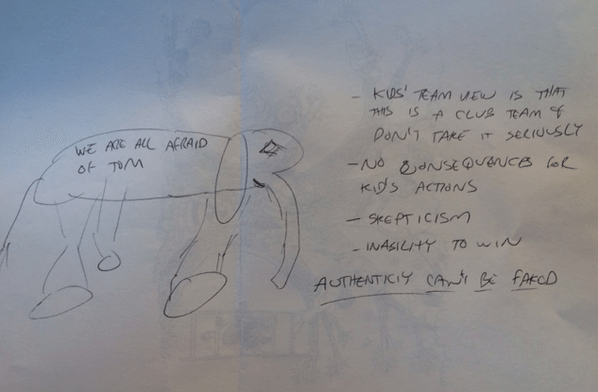–
Meeting #4 with Coaching coach – Dictators, Bullies, Narcissists, Saints, & Misfits
Had our fourth meeting with Scott Hearon, the co-founder of the Nashville Coaching Coalition. We went through the third chapter of Inside-Out Coaching by Joe Hermann. In this chapter Joe lays out the 5 main categories of transactional coaches – dictators, bullies, narcissists, saints, and misfits. While we can all sometimes slip one of these types of coaches, Joe made the great point:
‘When I feel (one of these) coming on, I try to comprehend the emotion and regain my rational self. I refuse to let unhealed wounds dictate my behavior or coaching style.’
We all have triggers that can push us into one of these transactional coaching styles, next week we are going to discuss what those triggers are and how we can be conscious of them and stop ourselves from slipping into being a type of coach we don’t want to be.
–
We also shared the 3 coaching archetypes that we each use as role-models.I couldn’t narrow it to 3 so I came up with 5. I based mine on the coaching characteristics I prioritize – the 6 F’s: Fun, Fundamentals, Friendship, Fight, Failure is part of the process, and Forge your own path.
–
1. Fun – Aaron Kail – One of my lifelong best friends, I worked in several management jobs with him and his teams were always having fun while I was just leading to get the job done. I learned from him that people will work much harder when they are having fun.
2. Fundamentals – Dave Cisar – Author of Winning Youth Football – Dave taught me about how keeping things simple and being awesome at the fundamentals is much more effective than complex playbook and always trying to come up with the next clever play. It reminds me of Joe Daniel’s quote:
’Keep things simple so that your kids build confidence: confident kids play fast, fast kids win games.’
3. Friendship & Fight – Herb Brooks – The USA coach from the Miracle game – The scene in the movie Miracle where coach asks each player ‘Who do you play for’ has been very inspiring to me on the power of coming together as a team and playing for a cause bigger than yourself.
4. Failure is part of the process – Carol Dweck – Author of the book Mindset – Failure is part of the process and to have a growth mindset is to embrace failure as the best teacher. I love the quote from Willie Cromack
‘Who will be brave enough to try that new move we have been practicing in the game today?‘
5. Forge your own path – Doug Keim – A childhood mentor of mine, Doug always had great insight on what was on the hearts of the kids he led. He was a youth group leader and they would give us printouts of what we were supposed to talk about each week, but Doug would often crumble those up and throw them in the fireplace and ask what was really on our hearts. Living life passionately pursuing your dreams and re-writing what society is expecting of you is a powerful lesson that Doug embodied. This is a complicated topic because I firmly believe in living according to high standards and morals, but where this fits in is not trying to just go with the flow but instead thinking out of-the-box to solve problems by doing what is right not what is popular. I have seen this play out in my coaching by questioning everything we do as a coaching staff and not accepting the answer ‘We just do that because that is what everyone has always done.’
–
More great conversation came out of hearing each other’s coaching archetypes, some of whom ranged from William Wallace in Braveheart, to Coach K, to childhood coaches. This is a really cool activity to do with your coaching staff and I would strongly encourage you to ask the other coaches you coach with who their role models are.
–






